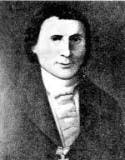Born in the family of a coast guard. His baptismal name is Martynas Ludvikas Rėza, he signed his works written in German as Ludwig Rhesa. Thinking that Duke Gediminas was a Curonian, he added the name Gediminas to his name, and became Ludvikas Gediminas Rėza.
After graduating from the university, he was a private teacher for several years, 1800-1816. was an army preacher in the King's crews. During the Napoleonic wars, he participated in the campaigns of the Prussian army, and stayed in many European countries. At the same time, he intensively worked on scientific work. in 1807 awarded a doctorate in theology for the scientific work "On the moral interpretations of the holy books according to Kant".
in 1809 appointed inspector of the Lithuanian Language Seminar of the University of Karaliaučius, he started teaching Eastern languages and some theological disciplines as a private docent. in 1816 he gave up his position as an army preacher and devoted himself to academic and scientific work. in 1819 awarded the degree of Doctor of Philosophy. in 1819 appointed ordinary professor of theology and advisor to the church consistory. in 1828 appointed professor of theology and dean of the Faculty of Theology at the Royal University. in 1829 elected adviser and honorary member of the Consistory and School College of the Province of Prussia.
As a priest, he cared intensely about religious literature. Prepared the third (1816) and fourth (1824) editions of the Lithuanian Bible, published (in German) "History of the Lithuanian Bible" ("Geschichte der litthauischen Bibel", 1816), "Philological critical notes on the Lithuanian Bible" (" Philologisch-kritische Anmerkungen zur litthauischen Bibel', 2nd, 1816 and 1824). in 1843 the set was printed a second time. The third edition, prepared by Mykolos Biržiška, was published in 1935, in 1958. the fourth (so far the latest).1809 and 1825 published 2 collections of poems in German called "Prutena oder Preussische Volkslieder", which are full of motifs from Lithuanian history, folklore, and mythology.
in 1818 was the first to publish Kristijonas Donelaitis's poem "Metai" with his own funds, wrote the introductory article. in 1824 along with his translated Aesop's fables, he also published six surviving Donelaitis' fables. in 1825 together with nine assistants, compiled the first collection of Lithuanian folk songs "Dainos, oder Littauische Volkslieder", which consists of 85 Lithuanian folk songs with translations into German, 7 song melodies, comments and the article "Research of Lithuanian folk songs".
